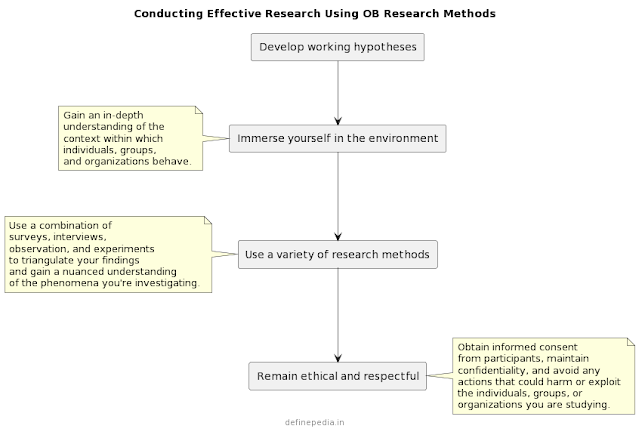Organizational Behavior Research Methodology works to understand and find solutions to difficult workplace problems. It is a research technique that can help you determine what really works and under what conditions?
{tocify} {$title=Table of Contents}
So, imagine you want to know the effectiveness of a particular intervention or treatment. Instead of conducting your own research, you can use a process known as meta-analysis. This involves collecting and analyzing data from many studies on the same topic, which were identify through a literature search.
Research Question
The first step in conducting a meta-analysis is defining the research question. This will help determine the constructs to be considered and the types of interventions to be analyze. Once you have a clear research question, you can start gathering data from primary studies by coding and extracting relevant information.
Meta-analysis appears to be a quantitative technique, implying that an effect magnitude may be calculate. The number of studies used in a meta-analysis, denoted by k, can range from just a couple to a large number, depending on the research question. And the total number of people included in those studies, denoted by N, can also vary.
By using rigorous statistical methods, you can objectively examine the published data and draw conclusions about the effectiveness of the intervention or treatment in question. Hence, if you want to do a meta-analysis, start by defining your research topic and gathering data from primary studies.
What are the different tools used in OB research methods?
When it comes to understanding how individuals, groups, and organizations behave, OB researchers have a whole toolkit at their disposal. These tools allow them to develop hypotheses and explore the relationships between different variables. Let’s take a closer look at a few of them of these tools.
Surveys
One of the primary methods used by OB researchers is surveys. Surveys are a way to elicit responses from individuals to specific questions. These questions can be open-end or close-ended it’s depending upon their situation or condition. For example, an open-ended question might be, “What motivates you to work hard?” while a close-ended question could be, “On a scale of 1-10, how satisfied are you with your job?”
Interviewing
Another tool used by OB researchers is interviewing. Interviews are a method of obtaining more detailed information from individuals, groups, or organizations. They can be organized, in which the interviewer asks a set of questions, or unstructure, in which the interviewer lets the conversation flow more freely.
Observation
Observation is also a powerful tool used by OB researchers. By watching individuals, groups, or organizations in action, researchers can gain valuable insights into their behaviour. This can be done in a naturalistic setting, where the researcher simply observes without interference, or in a controlled setting, where the researcher manipulates variables to see how they affect behaviour.
Experiments
Finally, experiments are another important tool used in OB research. In an experiment, the researcher manipulates one or more variables and observes the effect on other variables. This allows them to establish cause-and-effect relationships between variables.
Key Points
- Organizational Behavior Research Methodology works to understand and find solutions to difficult workplace problems.
- Meta-analysis is one research technique used to determine what works and under what conditions.
- Theory and research go hand in hand to explain and predict phenomena.
- Experiments, cases, and surveys are employed in research to establish cause-and-effect correlations.
- The validity of a study is dependent on internal and external validity.
- Internal validity is achieved by controlling threats such as history, maturation, testing, instrumentation, regression, selection, etc.
- External validity is concerned with the generalizability of results to a wide range of people and situations.
- Field studies have better external validity than laboratory studies.
- Longitudinal studies help to minimize common method variance.
- The best strategy is to use a variety of designs to answer the same question and to start with a laboratory study followed by a field study.
How to conduct effective research using OB research methods
First, you must involve yourself in the environment you are researching, whether through observation, interviews, or other means.
Another important strategy is to be open to discovery and inductive in your thinking. Rather than approaching your study with preconceived views of what you expect to find, try to approach it with curiosity and an openness to fresh ideas. This will help you to see things that might normally run your attention and to develop new senses and perspectives on the behaviour you were studying.
Basically, It is important to use various research methods for getting more clear overview of the behaviour under study.
Surveys, interviews, observations, and experiments all have advantages and disadvantages. And by combining them, you will be able to find and acquire a more comprehensive picture of the phenomenon you’re studying.
It’s important to remain ethical and respectful in your research practices. This means obtaining informed consent from participants, maintaining confidentiality, and avoiding any actions that could harm or exploit the individuals, groups, or organizations you are studying.
Was this helpful?
0 / 0
